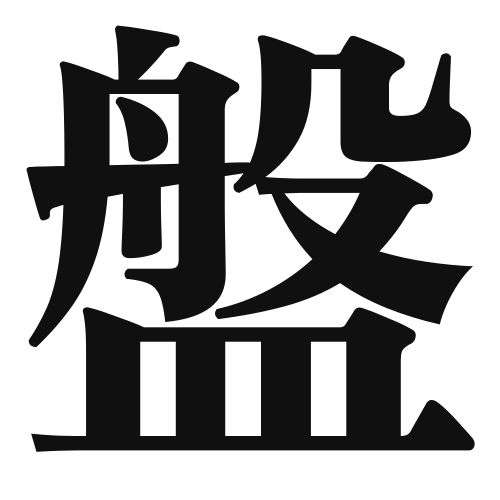1. Overview of Meaning
The kanji “盤” (ban) generally means “plate,” “disk,” or “board.” It is often used to refer to flat, round objects or surfaces, such as a game board or a record.
2. Formation and Radical
Formation of the Kanji: The kanji “盤” is a compound character, which means it is formed by combining different elements. It is classified as a phonetic-ideographic character (形声文字), where the left part suggests the meaning and the right part indicates the pronunciation.
Radical: The radical of “盤” is “石” (ishi), which means “stone.” This radical often relates to hard materials or objects.
3. Examples of Usage
Common Words and Phrases: Some frequently used words that include “盤” are:
- 盤面 (ばんめん, banmen) – game board
- 盤石 (ばんせき, banseki) – solid foundation
- 音盤 (おんばん, onban) – record (as in music)
Example Sentences in Daily Conversation:
- この盤面はとても面白いです。 (Kono banmen wa totemo omoshiroi desu.) – This game board is very interesting.
- 彼は音盤を集めるのが好きです。 (Kare wa onban o atsumeru no ga suki desu.) – He likes to collect records.
4. Synonyms and Antonyms
Similar Kanji: A similar kanji is “皿” (sara), which also means “plate” but typically refers to a shallow dish used for serving food. The difference lies in the shape and usage; “盤” is often larger and used for games or music.
Antonyms: An antonym could be “山” (yama), meaning “mountain,” as it represents something elevated and three-dimensional, contrasting with the flatness implied by “盤.”
5. Cultural and Historical Background
Relation to Japanese Culture: The concept of “盤” is significant in traditional Japanese games like Go (囲碁, igo), where the game board is referred to as “盤.” It also appears in various cultural artifacts and practices.
Proverbs and Idioms: One common idiom is “盤石の基盤” (ばんせきのきばん, banseki no kiban), which means “a solid foundation,” often used to describe a stable situation or reliable support in various contexts.
